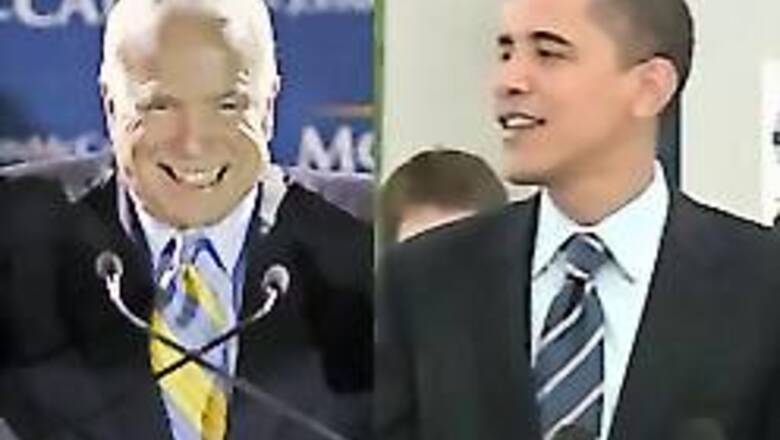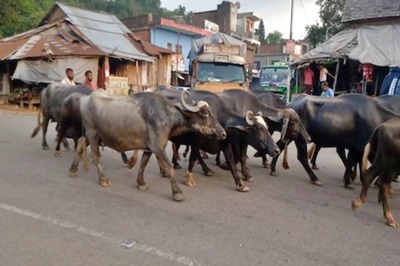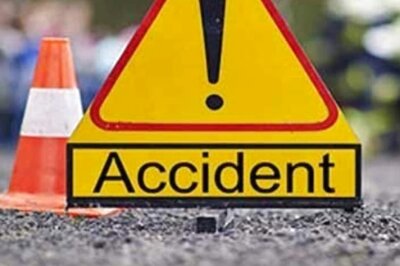
views
Mississippi: Barack Obama and John McCain returned to the campaign trail on Saturday after an intense first presidential debate in which they clashed over who could best lead the United States out of its financial crisis at a time when the country is fighting wars on two fronts.
In a face off Friday night that returned again and again to judgment, McCain portrayed himself as a battle-tested elder running against a naive, inexperienced liberal Democrat, while Obama suggested his conservative Republican rival is a hothead who showed poor judgment by making the wrong choices on the Iraq war, corporate taxes and other issues.
With 38 days left until the November 4 election, McCain is headed for Washington on Saturday and the dispute over a Wall Street bailout. Obama planned to appear with his running mate Joe Biden at rallies in Virginia and North Carolina, two Republican-leaning states where Obama thinks he can make inroads.
The nationally televised debate at the University of Mississippi presented a huge opportunity for the candidates to deliver their message to millions of Americans and win over undecided voters, particularly in the battleground states that will decide the election.
But neither candidate appeared to land a knockout blow or commit the kind of major gaffe that could turn the campaign around. That in itself was a net plus for Obama who held his own in a high-stakes debate focused on foreign policy and national security which are considered McCain's strongest issues.
Snapshot polls by both CNN and CBS News showed Obama with a clear advantage among voters in how people perceived the debate performance. CBS monitored a roomful of uncommitted voters and when asked who won the debate shortly after it was done, the number of people who raised their hands for Obama was more than double those for McCain.
Interest in Friday's debate was amplified by suspense about whether it would even take place. McCain had said he would not take part unless the financial crisis was resolved, then reversed course and decided at the last minute to participate without a deal on a bailout plan.
McCain, 72, frequently referred to his age and experience, emphasizing that he would cut taxes and stop wasteful spending. The Arizona senator went out of his way to mention the foreign countries he has visited and the years he has spent on Capitol Hill.
''I have a long record and the American people know me very well,'' he said.
Obama sought to connect with voters who might have doubts about a relative newcomer to national politics, a black man with an exotic name and background. He talked often about the struggles of ordinary Americans, ''the nurse, the teacher, the police officer who, frankly, at the end of each month they've got a little financial crisis going on.''
The Obama campaign tried to back up that point in its newest ad, a spot released Saturday that notes McCain never mentioned the middle class during the debate. ''McCain doesn't get it,'' the announcer says. ''Barack Obama does.''
Obama challenged McCain frequently and offered himself as someone who can be trusted to make sound choices.
Obama noted that he opposed invading Iraq, while McCain supported it. He said McCain has voted with the unpopular President George W Bush 90 per cent of the time. He argued McCain backs corporate tax breaks and lax regulation that have contributed to the Wall Street economic crisis.
''We have to recognize that this is a final verdict on eight years of failed economic policies promoted by George Bush, supported by Senator McCain,'' Obama said.
McCain said Obama did not have the knowledge or experience to keep the United States safe. Obama shot back that McCain was out of touch and showed flawed judgment by supporting the Iraq war, diverting troops needed to fight the main battle against al-Qaida in Afghanistan.
'''You said it was going to be quick and easy. You said we knew where the weapons of mass destruction were. You were wrong,'' he said. ''You said that we were going to be greeted as liberators. You were wrong. You said that there was no history of violence between Shia and Sunni. And you were wrong.''
Obama opposed the invasion of Iraq in 2002, before he was a member of Congress, while McCain voted in the Senate to authorize the war.
Obama suggested McCain might overreact to national emergencies, noting that the Arizona senator has talked about ''extinction'' for North Korea and joked about bombing Iran.
McCain accused Obama of seeking to ''snatch defeat from the jaws of victory'' in Iraq. He said the ''surge'' of U.S. troops has reduced violence there and withdrawing would destabilize the country and the entire region.
In its first post-debate TV ad, the McCain campaign accused Obama of ''playing politics ... risking lives'' when he voted against a war spending bill in May 2007, supporting the charge that Obama's ''not ready to lead'' with criticism from that time by Biden, now Obama's running mate. When McCain cited that vote during the debate, Obama defended it as being aimed at the lack of a withdrawal timetable, not at funding for troops.
McCain also criticized Obama for saying he would meet with Iranian President Mahmoud Ahmadinejad without preconditions. ''This is dangerous. It isn't just naive; it's dangerous,'' McCain said.
Both criticized Russia's invasion of Georgia and said Georgia and Ukraine should be free to join NATO. But Obama also said ''we also can't return to a Cold War posture'' with Russia. McCain took a tougher line, describing Russia as ''a nation fueled by petro-dollars that is basically a KGB apparatchik-run government.''
The two bickered at times, talking over one another and throwing accusations of twisted words and false statements. But Obama sometimes acknowledged agreements with McCain concessions that might reinforce the Democrat's claim to be a politician who can find common ground and reduce confrontation in Washington.
The contrast between the candidates, as they stood behind identical wooden lecterns was not only ideological. Obama, 47, is a first-term Illinois senator seeking to become America's first black president. The white-haired McCain, 72, a former Vietnam prisoner of war, has served in Congress for 26 years and would be the oldest first-term president.
The financial crisis reshaped the focus of the debate. Instead of dealing exclusively with foreign affairs and national security as planned, the first third of the 90-minute debate dealt with economic and financial issues.
Moderator Jim Lehrer's opening question concerned the economic crisis gripping Wall Street. While neither man committed to supporting bailout legislation taking shape in Congress, they readily agreed lawmakers must act to prevent millions of Americans from losing their jobs and their homes.
Both also said they were pleased that lawmakers in both parties were negotiating a compromise.
Neither could offer specifics about how the potential $700 billion price tag of a Wall Street bailout might affect their ability to implement all the campaign promises they have made.
The economy has dominated the presidential race and polls show Obama favored as the better candidate to reverse the slide. After McCain took the lead following the Republican National Convention early this month, polls now show Obama with a slight advantage.
The candidates are scheduled to debate twice more on October 7 and October 15. The vice presidential contenders, Biden, a veteran Democratic senator from Delaware, and Alaska Governor Sarah Palin, a newcomer on the national political stage, meet for a single debate on Thursday in St. Louis, Missouri.




















Comments
0 comment